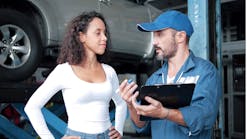In the world of automotive repair it may not be practice that makes perfect, but rather regular and ongoing training. Many shops may conduct in-house training, but it often remains ad hoc and sporadic. With the advent of new vehicle technology—as well as developments with hybrids and electric vehicles—there could be a need for a more formalized in-house training process.
Take advantage of opportunities.
The first thing to understand about training is that you're not in it alone—there are plenty of available opportunities. Kory Rozema, owner of Rozema's Car Care in Hudsonville, Michigan, regularly participates in ASE training and vendor-provided technical training. Rozema says it’s necessary to attend industry-specific management training and to participate in industry associations and trade shows.
With nine full-time staffers, Rozema's shop averages about 185 cars a month. He encourages training of his employees both in the shop and out of the shop. And if a question comes up that can't be answered, he goes the extra distance.
"I try to work with other shop owners so if there is something I don't know, maybe they do," says Rozema.
Continued Training
At Rozema's Car Care, training is ongoing, and that includes weekly lunchtime training, while Rozema ensures that training materials are provided for his staff.
"I can't stress how incredibly important it is to conduct regular training," Rozema says. "Cars are so much more advanced than just five years ago. To replace a battery might take an hour, because you need to go through all the 'relearns' and make sure the windows open, the lights turn on and the infotainment system works properly. What was a five minute job is now major work and the technicians need to know how to do it correctly."
While some might think such due diligence is overkill, the last thing a shop needs is a reputation that it had to turn away business because it wasn't prepared.
"You can't stop learning," Rozema says. "That is why we're doing training on the latest advancements at least twice a month, some in-classroom training at least once a month and hands-on training at least once a year."
Be a mentor.
For some employees, the thought of training could be a turnoff. However, constant training and the ability to service European imports has allowed Carrollton, Texas-based Blair Automotive to become the largest independent European service center in the country.
Blair Automotive has one week of mandatory paid training for all employees every year, but throughout the year provides a mentorship program with apprentices.
"We have 10 full-time technicians and three apprentices," says Ryan Blair, owner of Blair Automotive. "We've had a mix of employees, some with no previous experience who simply had a desire to become a mechanic and others who were graduates of UTI. But I've found that even those who may not have liked school have a desire to learn."
Blair says that a lot of the training at his shop is from experience.
"We have a lead technician who heads the training program, and this is actually new for us," Blair adds. "But it seems to be working."
In many cases training the "newbies" means they're taught the correct way the first time, and that can be especially important with European cars, which can present unique challenges.
"We have apprentices that are learning as they're doing oil changes and other basic maintenance," says Ryan. "Then the master tech looks over what was done with the apprentice. The training becomes a natural part of the process and they learn how everything works."
Be prepared for tomorrow.
As shops become more like a computer repair store, it can be harder for some of the old guard that remembers the good old days.
"You have to be a lot more tech-focused," says Rozema. "When we started I had a tool box, and there was the ratchet and air tools. Now everyone has a tablet or laptop, and we're seeing everyone is getting their own scan tools. While we still have brake jobs and alignments, we're doing a lot of ASE calibrations. However, with the younger guys it isn't convincing them to embrace the technology, but more about them getting their hands dirty that is the issue."
Rozema also explained that Ford has been very good at helping provide information for continued training while General Motors also keeps shops well informed, but warned that with many imports, shops may be left on their own.
This can be a challenge as models come out of warranty.
"We're starting to see hybrid Porsches" says Blair. "So we have to keep up with the old models, as well as the new. Fortunately for our business we're used to the challenges. These cars have several miles of fiber optics and can be incredibly complex. It means we need to learn their various issues and have to use the factory scan tools."
Blair adds that he's thinking of the next big thing in cars as well.
"We just hired a Tesla master technician. We're getting ready for dealing with electric cars, but that's probably something for another article."






